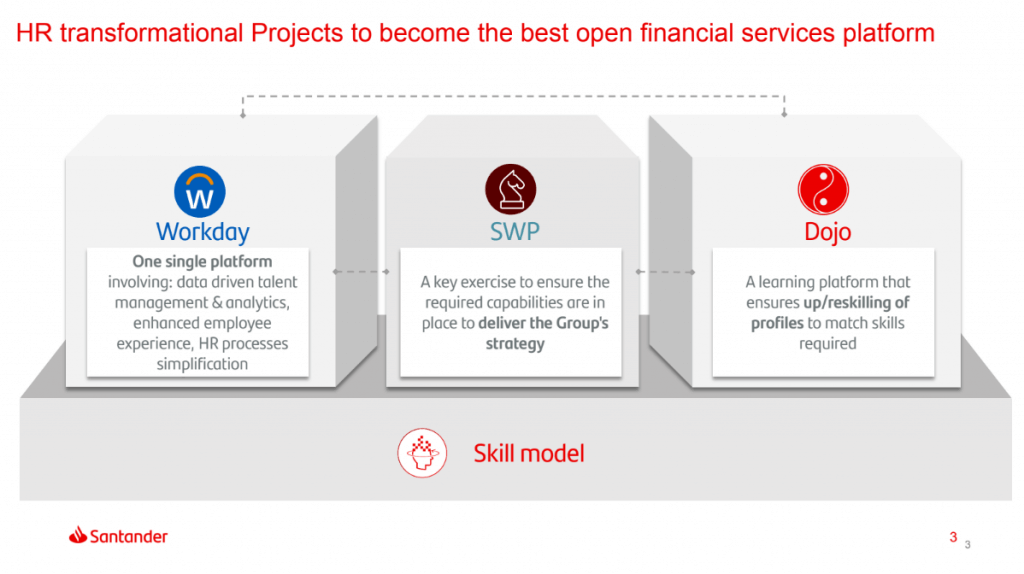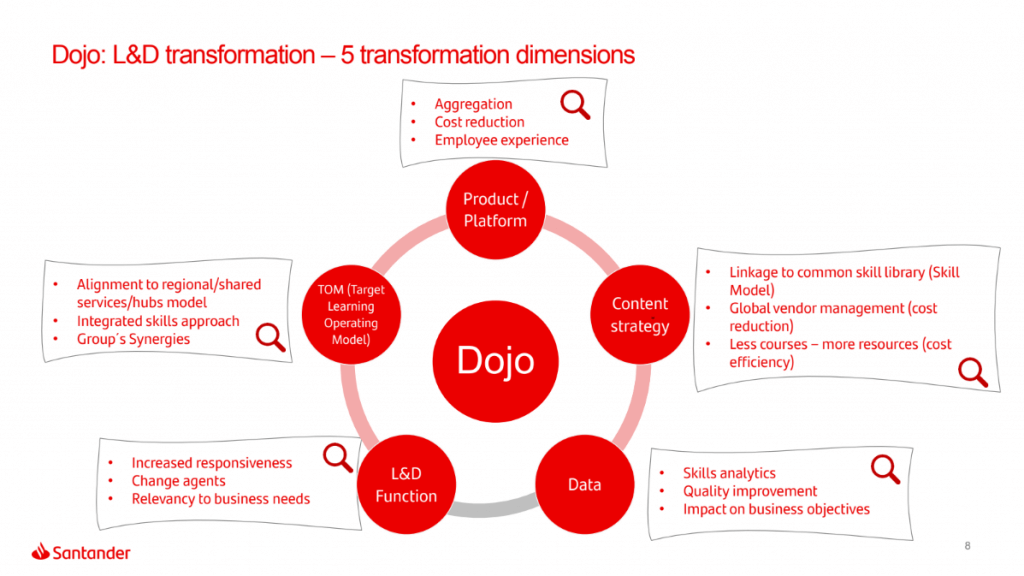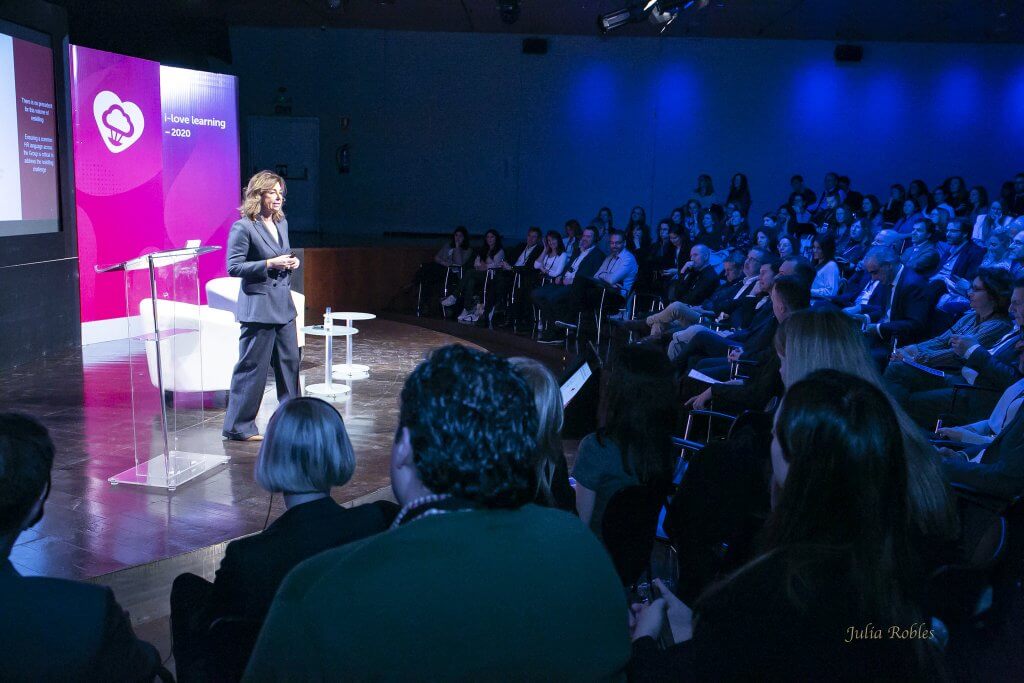Share
Last February 14th, I had the pleasure and the honor to be invited by Netex to their i-love learning event. I was asked to talk about our journey of Santander to become a learning organization, as a key enabler of the strategic aim to transform ourselves into the “best open financial services platform by 2025”.
This strategic goal of this statement would imply a thorough transformation process affecting business paradigms, processes, leadership style, roles, skills and capabilities, attitude towards learning. A real “revolution”! And what an exciting challenge!
The Global HR strategy is playing the role of key enabler of this transformation, through four key projects that are interconnected:
1. The implementation of Workday (Global HRIS) throughout Santander Group
2. The application of the Strategic Workforce Planning methodology (SWP) as key part of the business planning cycle
3. The transformation of the L&D function to allow the development of a new upskilling & reskilling ecosystem (DOJO). Leveraging on the change of the global L&D operating model and the implementation of a learning experience platform, DOJO will enable the massive upskilling/reskilling Santander needs to execute the business strategy.
4. The implementation and deployment of the first ever global skill model throughout the organization

My speech at the Netex event focused on the two initiatives that are directly under the responsibility of my department: DOJO & Skill Model.
Let’s dive into each one of the topics, highlighting the main features of each of them.
1) DOJO: Learning & Development global transformation
To become the best open financial services platform, Santander must transform into a continuous learning organization. This will be achieved by transforming the L&D function and implementing a state of the art learning ecosystem.
Dojo is the program that enables the L&D transformation in Santander, through 5 dimensions:
- Global Content Strategy
- New L&D skills and profiles
- Data
- L&D operating model
- Technology

Each one of these dimensions are critical to the success of the program and are interconnected.
The Global Learning Council (GLC), composed of the CLOs of each country and launched with this purpose in May 2019, is the backbone of the DOJO program.
The technological transformation is based on a Learning Experience Platform that connects learning ecosystems currently existing around the various Santander Group enterprises, making them available to all employees through a single point of access. Moreover, Dojo will get connected to external trusted sources of information and training, such as Netex learningCloud, one of the products we have selected due to the very positive customer experience we had in Academia Mexico.
The main goals for DOJO are:
• Transform Santander’s coursed-based training to a skill-based training approach, linked to the new global skill model shared with Workday and SWP.
• Leverage the Group’s investment on training, eliminating duplicities.
• Issue certifications (badges) based on expertise that account for the learner’s proficiency level on skill/job profiles.
• Upskilling based on employee interaction both with content and people – subject matter experts (Scouts), 70/20/10 model (experience/peer2peer/contents).
• 24/7 availability, anytime, anywhere allowing our employees to learn “in the flow of work”.
• Data-driven learning management and decision making
• Process automatization with powered by Artificial Intelligence
• Santander L&D profiles transformation and a new operating based on hubs/shared services
Thanks to the DOJO platform, the Santander employees will know where they stand and what they need to do to take their career wherever they want it to go.
2) Global Skill Model: a common language to drive talent development and organizational excellence
Skill Model Project is addressing two main goals that will enable required upskilling and reskilling:
1. Let our employees know what they will need to know:
Identify the critical skills our workforce will need to acquire to contribute to the transformation of Santander. As a consequence, we will be able to identify the most important skills for each SWP Job Family and common jobs
2. Understand what our employees currently know:
Map the internal capabilities of our workforce in order to create an “Inventory of the Knowledge” within Santander. This will help improve the planning of resources, facilitating the implementation of agile ways of working. In addition, capacity gap assessment can be performed with the aim of upskilling/reskilling our people in the key areas. Furthermore, the number of employee data points available will exponentially increase, allowing for Big Data solutions within Human Resources.
Partnering with IBM Watson, the Skill Model establishes a common language to define the critical capabilities required to evolve the organization towards the future Santander. This language includes:
- Common Taxonomy
- Common Skill Library
- Common Proficiency Levels (4 levels of expertise)
The ultimate goal of the Skill Model Project is to enable the creation of “Common Jobs” in Santander, positions that perform the same tasks need to have the same skill requirements, regardless where they are based. This will enable the transformation of Santander into a global open Financial Services platform.
All the different components of the Global HR Strategy in Santander get interlocked to form a holistic approach, embedding the entire employee journey and looking at organizational excellence as a target.
In this fast changing and unpredictable environment, it is critical for any company to ensure the right focus on talent, skills for the future and organizational design, having clarity on the strategic vision and the business goals.
And I can say that today Santander stands out on all of that.
Share

